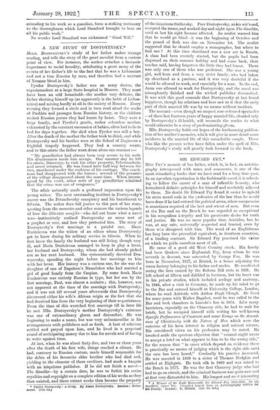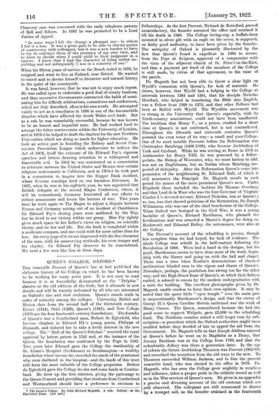SIR EDWARD FRY.* Miss Tav's memoir of her father, which
is, in fact, an autobio- graphy interspersed with notes and comments, is one of the most stimulating books that we have read for a long time past. In an age when opportunism is the fashionable creed, it is refresh- ing to follow the career of a man of inflexible honesty, who formulated definite principles for himself and resolutely adhered to them. No doubt Sir Edward Fry found it easier to uphold his stern moral code in the profession of the law than ho would have done if he had entered the political arena, where compromise is sometimes required of the best and wisest of men. But even at the Bar and on the Bench he was regarded as exceptional in his scrupulous integrity and his passionate desire for truth and justice. He was no more popular than Aristides, but ho was, at any rate, universally respected and trusted, even by those wLo disagreed with him. The word of an Englishman has long been the proverbial equivalent, in Southern countries, of a binding contract. Sir Edward Fry practised the virtue on which we pride ourselves most of all.
He came of a good old West Country stock. His family had been Quakers since Zephaniah Fry, from whom he was seventh in descent, was converted by George Fox. He was born in November, 1827, at Bristol, in a house adjoining the cocoa factory belonging to his father and uncles. He recollected seeing the fires caused by the Reform Bill riots in 1831. He left school at fifteen and dabbled in business, but his heart was in his private studies, which included zoology and anatomy. In 1848, after a visit to Germany, he made up his mind to go to the Bar and entered himself at University College, London, -where he read Aristotle with Arthur Hugh Clough. He lived for some years with Walter Bagehot, until ho was called to the Bar and took chambers in Lincoln's Inn in 1854. Like many barristers, especially on the Chancery side, he had to wait for briefs, but he occupied himself with writing his well-known Specific Performance of Contracts and some•Easays on the Accord- ance of Christianity with the Nature of Men which were the outcome of his keen interest in religion and natural science. His considered views on his profession may be noted. Ho brushed aside the specious objection that " counsel ought never to accept a brief on what appears to him to be the wrong side," for the reason that " in cases which depend on evidence there is practically no means of judging which is the right side until the case has been heard." Gradually his practice increased. He was married in 1859 to a sister of Thomas Hodgkin and settled at Highgate. He took silk in 1869 and was raised to the Bench in 1877. He was the first Chancery judge who had had to go on circuit, and the criminal business was quite new and at first very distasteful to him. His longest and mcst interesting • A Memoir of the Right Honourable Sir Edward Fry 1827-1018. By kin daughter, Agnes Fry. Compiled largely from an Autobiography written tor hie Family. London : 11.1111ford. 1123. ad. net.]
Chancery case was concerned with the early telephone patents of Bell and Edison. In 1883 he was promoted to be a Lord Justice of Appeal.
" In some ways I felt the change a pleasant one : in others I felt it a loss. It was a great gain to be able to discuss points of controversy with colleagues, but it was a now burden to have to try to convince them of the accuracy of my own view, and to have to decide when I could yield to their judgment in a matter. I knew that I had the character of being rather un- yielding and not infrequently I was in a minority of one."
When his fifteen years of service on the Bench ended in 1892, he resigned and went to live at Failand, near Bristol. He wanted to travel and to devote himself to literature and natural history
in the quiet of the countryside.
It was fated, however, that he was not to enjoy much repose.
He was called upon to undertake a good deal of county business, and then successive Governments contracted the habit of nomi- nating him for difficult arbitrations, committees and conferences, which are duly described, often in his own words. He attempted vainly to act as a conciliator in 1898 in one of the innumerable disputes which have afflicted the South Wales coal trade. But as a rule he was remarkably successful, because he was known to be an honest and impartial man. He had worked hard to assuage the bitter controversies within the University of London. and in 1903-5 he helped to draft the charters for the new Northern Universities which are doing so much for higher education. He took an active part in founding the Bribery and Secret Com- mission Prevention League which endeavours to enforce the Act of 1906, itself the outcome of Sir Edward Fry's vigorous speeches and letters drawing attention to a widespread and lamentable evil. In 1902 he was nominated on a commission to arbitrate between the United States and Mexico over certain religious endowments in California, and in 1904-5 he took part
in a commission to inquire into the Dogger Bank incident,
where Russian warships fired on our harmless fishermen. In 1907, when be was in his eightieth year, he was appointed first British delegate at the second Hague Conference, where, it will be remembered, Germany frustrated all our efforts to reduce armaments and lessen the horrors of war. Two years later he went again to The Hague to adjust a dispute between France and Germany arising out of an incident at Casablanca.
Sir Edward Fry's closing years were saddened by the War, but he lived to see victory within our grasp. Miss Fry rightly
gives much space to her father's views on religion, on scientific theory, and on law and life. But the book is completed within a moderate compass, and one could wish for more rather than for less. On every page of it we are impressed with the fine character of the man, with his unswerving rectitude, his even temper and his charity. Sir Edward Fry deserves to be remembered. We need a few men like him in these days.



































 Previous page
Previous page